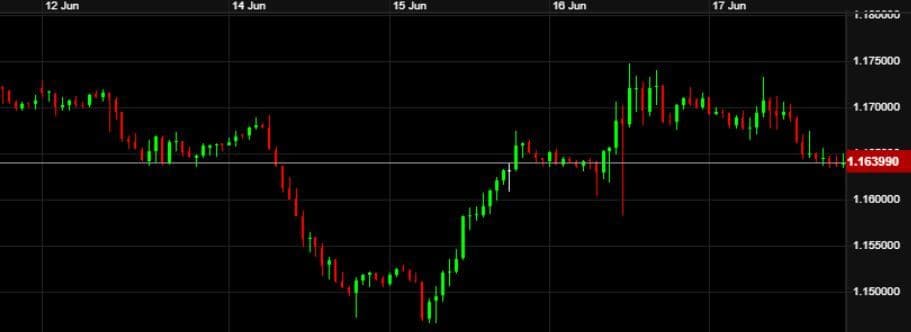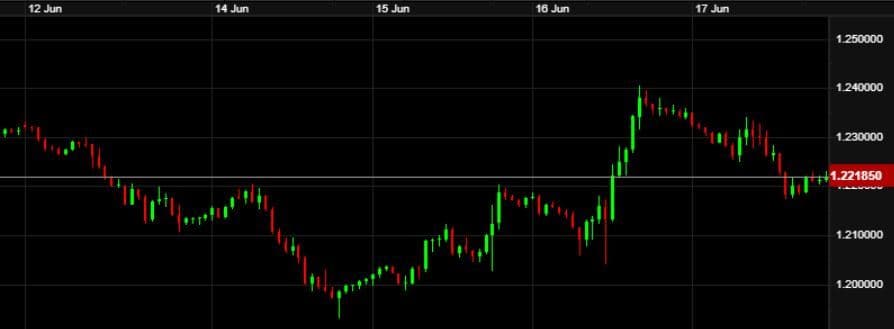ACM Update 20-06-22

There were interest rate announcements galore last week, with four differing rate decisions from four central banks, as well as an emergency meeting from another. After a US bank holiday today, all eyes will be on Wednesday morning for the latest on the UK’s ever-increasing inflation picture.
The Bank of England made it five in a row last week with one of the most predictable interest rate announcements in a while, raising rates by 0.25% again. Whilst all nine members voted for the hike, as in the May policy meeting three members of the committee wanted a 50-basis point rise in this meeting. This gave GBP a midday boost on Thursday after the announcement, helping sterling recover some of the ground it has lost of late against other major currencies.
Another base rate rise of at least 25-basis points seems inevitable for the next convening of the MPC on 4th August. UK Unemployment data released last week showed a rise to 3.8% (3.7% last month), whilst average earnings also fell short of expectation at 6.8%. In fact, the majority of recent UK data has been fairly poor, which isn’t helping either sterling as a whole, or the likelihood of tougher times to come for the UK economy.
GBP briefly fell to its lowest point against the Euro since February 2021 last week, with recent moves illustrated in the chart below:

Sterling-Euro is likely to remain volatile for the foreseeable, so opportunities could well arise for both buyers and sellers in the coming weeks. Please make sure the team are aware of any pending requirements you might have, to ensure we can act appropriately.
The US Dollar continued its resurgence last week. The anxious state of global markets led to the greenback being the flavour of the week (arguably month and quarter also). Safe haven assets naturally have benefitted from the recent unrest and the Dollar was the major beneficiary of that last week.
At one point on Tuesday GBP-USD had moved by 6.66 cents (over 5%) in less than a week. This was even prior to Wednesday evening’s rate hike from the Federal Reserve. The meeting saw a hike of again a somewhat expected 75-basis points to try and curb inflation. Moves for the week can be seen in the chart below:

Treasury Secretary Janet Yellen said over the weekend that high inflation is “locked in for the rest of the year”. US Retail Sales fell short of expectation for the fourth month in a row, this time with a contraction of -0.3%.
The ECB shocked everyone by announcing an emergency meeting last week to “discuss market conditions”. Lagarde & Co then “un-shocked” everyone by doing absolutely nothing… They announced a plan, essentially which was to come up with a plan, to reduce bond market volatility. Or as their statement read:
“The Governing Council decided that it will apply flexibility in reinvesting redemptions coming due in the PEPP portfolio, with a view to preserving the functioning of the monetary policy transmission mechanism, a precondition for the ECB to be able to deliver on its price stability mandate.”
Read into this what you will, but the ECB seem to have realised they need to act appropriately and swiftly, to look after their member states.
Over the weekend, Emmanuel Macron has also lost his majority in the French National Assembly. Whilst the news has not yet had an impact on the Euro, it will definitely make passing legislation more challenging for one of the EU’s larger members.
Elsewhere in the land of central banks, we saw the Swiss National Bank spring a surprise with their first interest rate rise since 2007, with a 50-basis point hike to -0.25% (again to curb inflation). The only bank to hold rates last week was the Bank of Japan, leaving rates unchanged at -0.1%, where they have been since February 2016.
If the above demonstrates anything, it is very much that even the top central banks of the world aren’t sure as to what to do with regards to monetary policy at the moment! Taking your risk off the table is invariably the most sensible approach in the current climate, so ensure to speak to the team to establish how we can assist in this area.
This week:
Monday – US Bank Holiday (Juneteenth), Christine Lagarde speeches (2pm & 4pm UK time)
Tuesday – Reserve Bank of Australia Monetary Policy meeting minutes (2:30am) Canada Retail Sales (1:30pm)
Wednesday – UK Inflation data (exp 9.1%, 7am), Canada Inflation (1:30pm), Jerome Powell testifies to Senate Banking Committee (2:30pm)
Thursday – Manufacturing & Services PMI Data for UK, Eurozone & US (8:15am to 2:45pm), Jerome Powell testifies to House Financial Services Committee (3pm)
Friday – UK Retail Sales (exp -0.6%, 7am)
The week ahead isn’t as busy in terms of interest rate announcements, but there is still plenty going on as we race through June. Monday being a US bank holiday will inevitably see a slightly slower day with no Dollar-based business.
Tuesday morning’s minutes from the latest RBA (Reserve Bank of Australia) meeting will be an interesting read. These are the minutes from a fortnight ago, when the RBA rose rates by half a per cent. Clues as to whether they see fit to take further action on 5th July will be sought. This seems like a strong possibility in light of moves from others over the last week.
The UK will be in the spotlight on both Wednesday and Friday morning. The former being the major event of the week, as UK inflation hits the headlines again. Expectations are for the figure to be 9.1% (versus 9.0% last month), however it has exceeded expectation in for six out of the last seven months. Retail sales on Friday will give further clues as to UK economic performance in the foreseeable future.
We continue to see what must be referred to a sizeable volatility in FX markets at the moment. Should you have any pending requirements, it is important to speak to your point of contact within the Aston team for up to the minute information. Another bumpy week ahead, probably.
Have a great week.